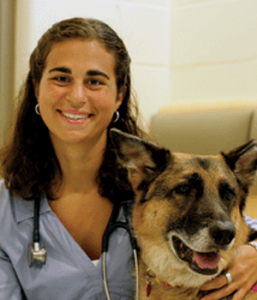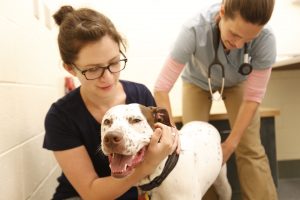-
Adopt
-
Veterinary Care
Services
Client Information
- What to Expect – Angell Boston
- Client Rights and Responsibilities
- Payments / Financial Assistance
- Pharmacy
- Client Policies
- Our Doctors
- Grief Support / Counseling
- Directions and Parking
- Helpful “How-to” Pet Care
Online Payments
Emergency: Boston
Emergency: Waltham
Poison Control Hotline
-
Programs & Resources
- Careers
-
Donate Now
 By Angela Mazza, DVM
By Angela Mazza, DVM
angell.org/generalmedicine
generalmedicine@angell.org
617-522-7282
As with your own health, annual exams are recommended for your companion pet as a tool to help maintain the best quality of life and to be more preventative than reactionary to disease processes. Annual exams are not just ploys to get pets to their veterinarian for over vaccination. They include a thorough history as to how the pet is doing at home on a day to day basis, a thorough physical exam, and discussion of treatment options and/or diagnostic tools to help further assess your pet’s health.
History
This is the part of the exam in which we ask about housing, diet, exercise schedule, medications, supplements, and previous vaccine history or medical problems. We also ask about appetite and thirst, your pet’s elimination patterns, energy level and if you have any concerns such as vomiting, diarrhea, or pain. It is up to you as the owner to give us all the details as your pet cannot verbalize how they are feeling. Pets, especially cats more than dogs, tend to hide disease very well so any subtle detail should be reported to your veterinarian as it may be more insightful than you might think.
Physical Exam
 This involves a complete head to toe evaluation of your pet. Ears are assessed for indication of infection or bad odor that could signify disease in the ear canal. Eyes are assessed for signs of inflammation, cataract, infection, or visual deficits. Even the nose is evaluated to make sure there is no nasal discharge or concerning nasal congestion-type sounds. The oral cavity is evaluated not only for signs of dental disease including fractured or infected teeth but also for any oral masses or ulcers that could cause pain or discomfort and be indicators of more insidious disease. Moving away from the head, we assess lymph nodes to any enlargement or pain. Lymph nodes can be increased in size due to infection, inflammation or unfortunately cancer. We listen closely to the chest to assess both heart and lung sounds. Heart murmurs can be early indicators of heart disease and prompt further evaluation. Heart arrhythmias are especially important to detect as they can be fatal with little to no warning. Moving on to the abdomen, we ensure that the pet is not painful with gentle palpation. Abdominal palpation can be limited by the size of the pet, but it is possible to find concerns such as masses, an enlarged spleen or liver, and appreciate abnormalities in kidney size and architecture. Continuing on, muscle mass is assessed. Decreased muscle mass can be an indicator of decreased mobility which is often caused by pain but it can also be associated with some endocrine diseases. A complete orthopedic exam may not be done at every annual exam but we generally palpate over the long bones and joints to look for glaring abnormalities or indicators of pain. The most common condition found on routine exams is degenerative joint disease. And lastly, depending on the age of the pet, and more often in dogs than cats, a rectal exam is performed. Rectal masses can be appreciated as well as diseases of the anal sacs.
This involves a complete head to toe evaluation of your pet. Ears are assessed for indication of infection or bad odor that could signify disease in the ear canal. Eyes are assessed for signs of inflammation, cataract, infection, or visual deficits. Even the nose is evaluated to make sure there is no nasal discharge or concerning nasal congestion-type sounds. The oral cavity is evaluated not only for signs of dental disease including fractured or infected teeth but also for any oral masses or ulcers that could cause pain or discomfort and be indicators of more insidious disease. Moving away from the head, we assess lymph nodes to any enlargement or pain. Lymph nodes can be increased in size due to infection, inflammation or unfortunately cancer. We listen closely to the chest to assess both heart and lung sounds. Heart murmurs can be early indicators of heart disease and prompt further evaluation. Heart arrhythmias are especially important to detect as they can be fatal with little to no warning. Moving on to the abdomen, we ensure that the pet is not painful with gentle palpation. Abdominal palpation can be limited by the size of the pet, but it is possible to find concerns such as masses, an enlarged spleen or liver, and appreciate abnormalities in kidney size and architecture. Continuing on, muscle mass is assessed. Decreased muscle mass can be an indicator of decreased mobility which is often caused by pain but it can also be associated with some endocrine diseases. A complete orthopedic exam may not be done at every annual exam but we generally palpate over the long bones and joints to look for glaring abnormalities or indicators of pain. The most common condition found on routine exams is degenerative joint disease. And lastly, depending on the age of the pet, and more often in dogs than cats, a rectal exam is performed. Rectal masses can be appreciated as well as diseases of the anal sacs.
Weight is also an important health parameter that we evaluate during the physical exam. It is often hard to pick up subtle weight gain or loss in companion animals but fluctuations in weight alone can be indicators of more concerning disease process in pets.
Discussion of diagnostic tests and or treatments
Based on the history and exam findings, if you are reporting a happy and healthy pet at home and our exam supports that finding with no abnormalities on physical exam, your veterinarian will discuss if your pet is due for any vaccinations or routine testing such as for fecal parasites or heartworm disease and those treatments will be performed. It is also recommended to refill your pet’s preventative medications to have on hand for the next year. If your pet is getting older but still clinically doing well, we will also discuss getting some baseline lab work to have as a benchmark. Sometimes, we find disease that is not expected or clinically apparent to owners. Remember, your pet cannot talk so often we have to be detectives and look to make sure there are no problems.
If you have concerns about how your pet is doing and/or there are concerns on physical exam, your veterinarian will discuss those with you along with what we call rule outs. Rule outs are the diseases or conditions that we think are most likely the cause of concern for your pet. Then we discuss with you what diagnostic tools we have to sift through the possibilities and hopefully give you a more specific diagnosis. The diagnostic tools most often utilized include blood and urine testing in the laboratory, skin, hair or ear sampling for cytology under the microscope, imaging such as x-rays and ultrasound. If a diagnosis can be made based on immediate in office testing or physical exam alone, treatment can be initiated at the time of the visit. If however the diagnoses cannot be made at the time of exam, you and your veterinarian can agree on what testing to start with and get the ball rolling to “work up” your pet.
In summary, annual exams are important tools that we as your pet’s doctor utilize to best maintain a healthy, comfortable, hopefully disease free pet! But if there are concerns, it is best to be proactive than reactive to health concerns for best possible outcome. So if you haven’t already, schedule your pet’s annual physical. It will do the body good.